Last year, we were the first to cover RS11 on the eve of it hitting the legal markets for its first drop. Now, we’re sitting down with its breeder, Deep East Oakland Farms, to get the whole “streets to heat” story.
While DEO – the abbreviated version of the name used by the world’s most elite cannabis enthusiasts – already had plenty of hype going into last fall when RS11 dropped on L.A. via their collaboration with Wizard Trees and Doja Pak, that moment ignited a whole other level of hype rocket we’re now seeing live. Their second-place overall finish in Zalympix a couple of weeks ago with Zoap only reinforced the elusive breeder’s mark on the game.
We chatted briefly with DEO Farms in the months since things went to the next level, but always around really specific genetics stuff. His schedule finally allowed for him to sit down with us for the full tale of how a company founded in the heart of one of the communities hit the hardest by the war on drugs clawed its way to the top with elite cannabis. All that while maintaining in Oakland. The city has been notoriously brutal when it comes to statistics on the cannabis industry falling victim to crime. The nation’s oldest black-owned dispensary, Purple Heart, is still yet to reopen as thieves used the cover of last summer’s police brutality protests to clean the shop out.
Within this reality on a daily basis, DEO Farms continued its climb to the top.
We asked DEO Farms when it was first exposed to the medical cannabis scene? He laughed, noting it was hard to date the initial exposure, but he made up a case of migraine to get his first 215 card about 12 years ago.
“I got the card first and was buying weed with it, but it was a couple of years before I started growing,” DEO Farms told L.A. Weekly. “The first cut I ever grew was OG. I didn’t know what OG was. It came as a cut called Super Kush. I still have the cut; I call it Vintage 98 OG because my uncles got it in around 1998 and it was just labeled Kush.”
Besides getting the hookup on the OG cut, DEO laughed while noting any cultivation efforts in the family were very separate, “so it was kind of just like they never included me bro. They never put me on. They never included me with anything. I did everything on my own.”
To start down his journey, he would purchase a house after working in his youth to bankroll it.
Before ever getting his hands on the property, DEO had previously scored some grow equipment. He put it in a storage unit while some of his peers made a quick buck. “I saved all the equipment, everyone else sold their equipment,” he said. Six months later he was ready to put those lights to work in the new house, but the three-foot crawlspace wasn’t going to be able to facilitate the new goals.
He went to Home Depot and got a pickaxe and shovel. His cousin would join him in digging out the crawl space during the week, and then getting rid of the dirt on the weekend to avoid any trouble with local inspectors.
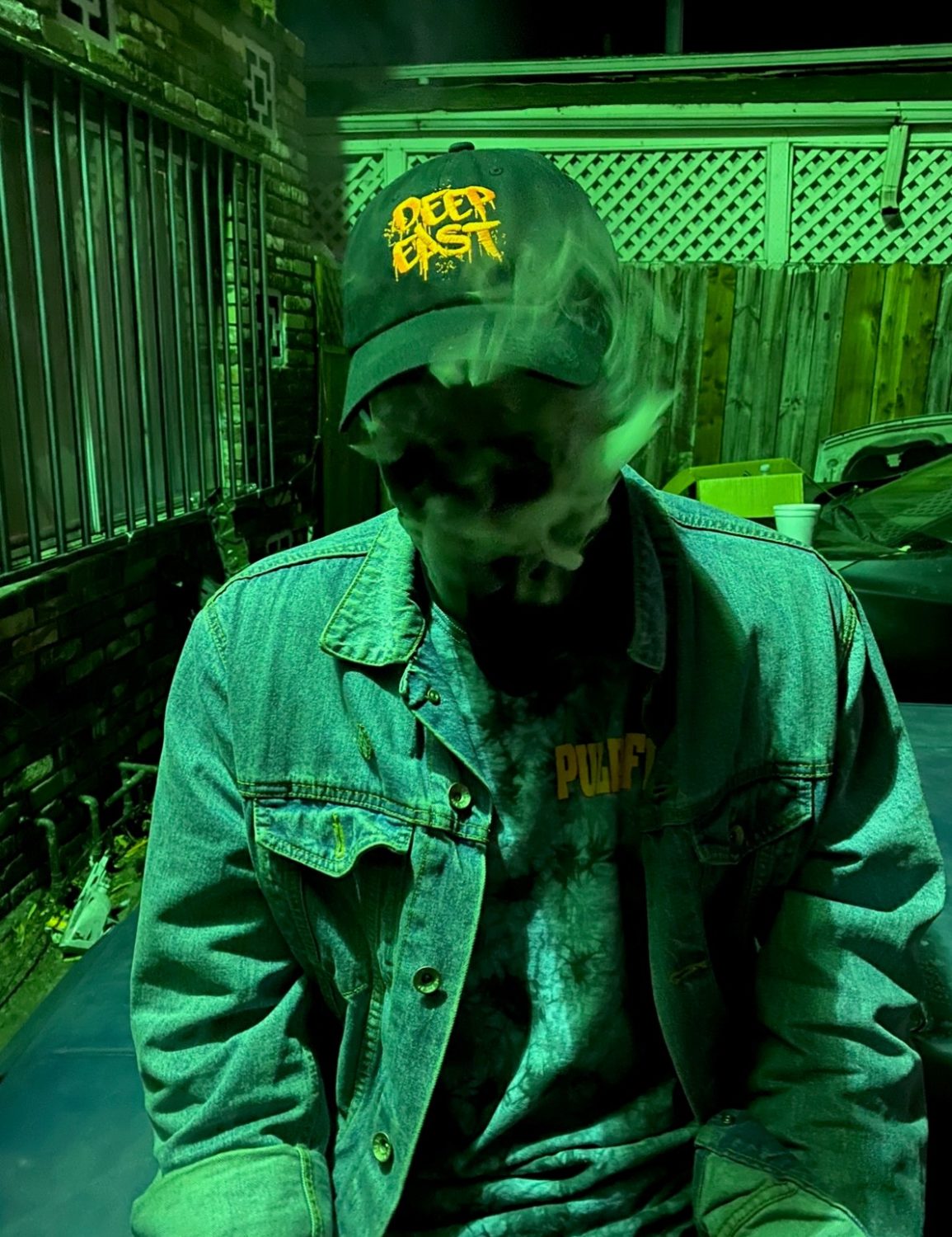
DEO’s cousin @_wahak
“Monday to Friday, we’d be digging the crawl space out. Under the first foot of dirt, it was all clay,” DEO Farms said. “That first foot was cool with the shovel, but after that, it was all pickaxe.”
But the backbreaking effort was a success. Eventually, they dug out a 10 x 10 room with eight foot ceilings. They started with four lights. Half Hindu Kush and half of that OG cut he got from family.
“I thought I was just on top of the world,” he said. “I was getting like a pound and a half a light. I thought it can’t get any better. Then I got a purple cut. I got a granddaddy purple cut and I was just killing it in Oakland around that time with purple.”
While it was the tail end of the purple hype wave, it was still very lucrative to do it well at that moment. Especially with Oakland being the place that went the craziest over purple.
With the new success, they needed more room. They busted out the shovel and pickaxe again to dig out the rest of the basement and pour concrete floors. In the process, and after a few blisters, they quadrupled the number of lights they were able to run under the house.
Now with a 16-lighter, a very reputable small-scale operation to this day, DEO Farms was on a new footing.
“That’s when I really thought I was unstoppable. And that’s when I really stopped going out,” he said. “I had a child when I was a teenager, so I never really went through a party stage. When everyone was going out, I would just be in the garden chilling, smoking. I had my PS five down there. I mean my PS whatever, it was probably three back then. When everyone was on the block or going to parties popping bottles, I would just be with the plants.”
While his friends hit the weekend circuit, he found community in cannabis cultivation web forums like IC Mag and THCFarmer. Via the communities, he’d get a lot of information and the opportunity to purchase solid genetics. He ended up doing pheno hunts of various strains including GMO.
“I was following Ivan from the Jungle Boys like a hawk. Everything he would try I would implement. No lie. His White Fire 43 pheno hunt is really what inspired me to start popping seeds,” DEO said.
DEO knew they wanted to dive into one line, as opposed to popping a ton of different seeds. In his first attempt, he linked up with Exotic Genetics on a trip to Seattle and scored 12 packs of Cookies and Cream.
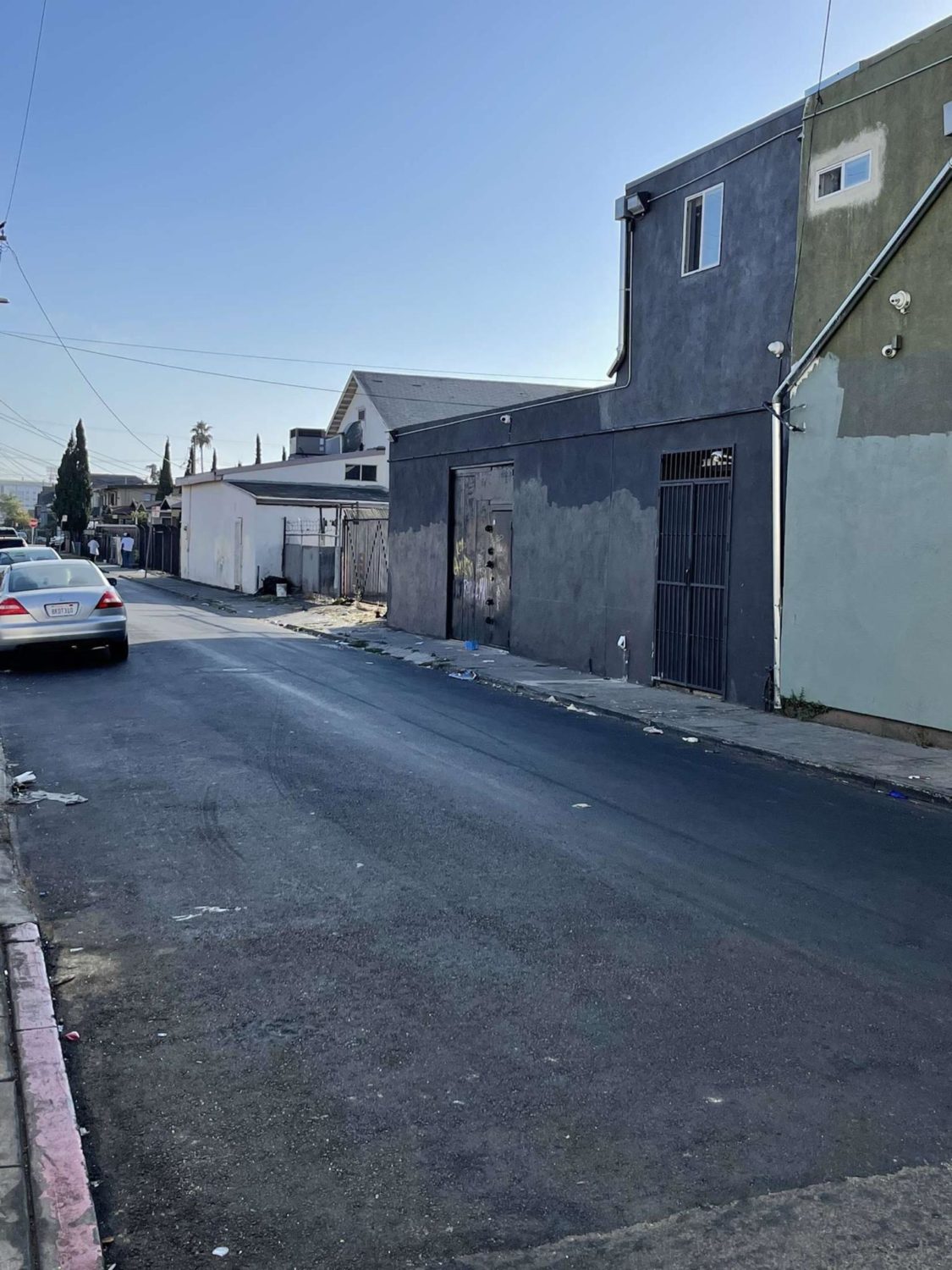
DEO Farms’ former warehouse operation was targeted by thieves over 20 times.
“That’s really how I got popular on Instagram was doing pheno hunts,” he said.
But it would change when he got his hands on 12 packs of Dying Breed Seeds’ OZ Kush at the Emerald Cup. The famed Eddy OG x Zkittelz cross is still a huge seller. To put it to scale, the team at Wonderbrett found their killer OZK cut in two packs. DEO Farms has six times as many opportunities to find killers.
“That first drop is probably the best seeds that I’ve ever run my entire life. And that’s when I’m like, ‘Bro, this is what I want to start my whole line with.’ It was that good,” he said.
The #41 pheno tasted like Kearn’s Pink Guava Juice. He used some of the pollen he got from a male in the wider hunt to do some backcrossing and DEO’s first big local hit Pink Guava was the result.
“I basically F2’ed the OZ Kush. And that’s what I called the Pink Guava. I was running the Pink Guava for a while. And then I crossed that to the Sunset Sherbert, and that’s where the whole RS line was born,” he said.
The RS came from an open pollination of six strains. But it was the winner of the pack because Sunset Sherbert was the team’s favorite smoke at the moment. He plans on diving into those other five strains in the future.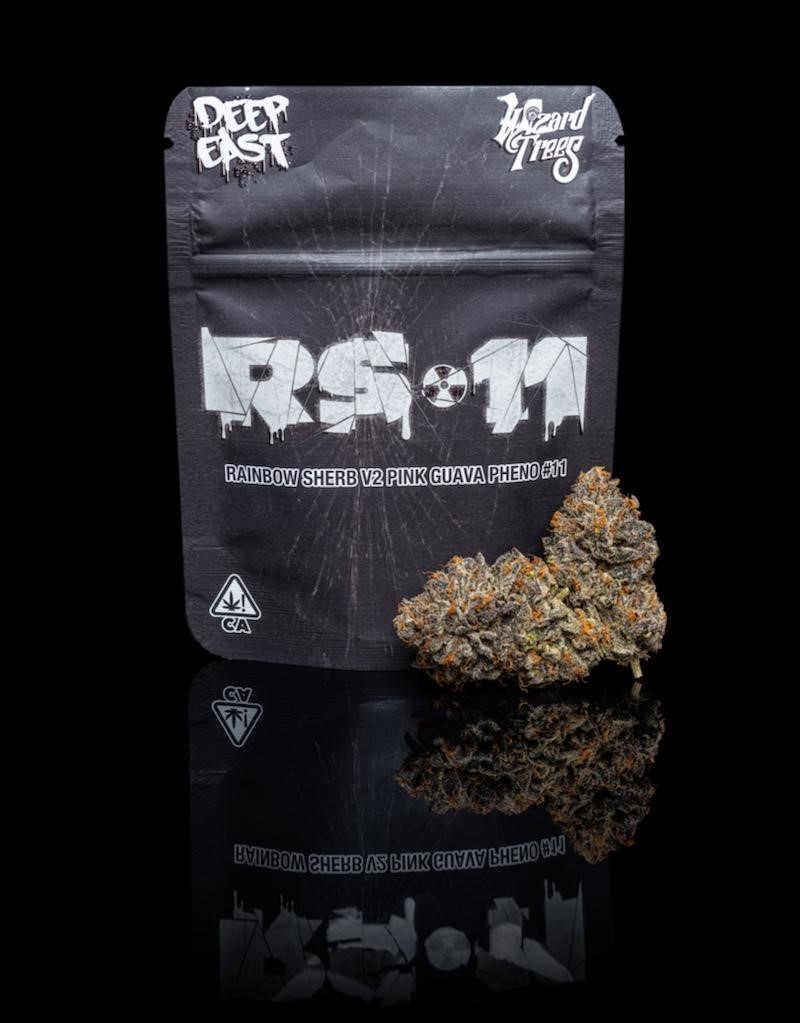
“I popped around 120 of those Rainbow Sherbert seeds and I kept four phenos,” DEO explains. “Wizard Trees has the exact same seeds from that original seed stock. He found the #54 and #11 that he kept. I kept the #16, #40, #7 and #18. The #7 was the most OZ Kush leaning. The #40 and the #18 are very similar to the RS11. I just recently did a #40 drop, just like a little throwback. And the #16 is, I want to say, the most Sherb leaning. It’s more similar to like a Studio 54.”
We asked how many more generations of effort have gone into the line since those first Rainbow Sherbert propagations.
“Right now, I’m working on the F4 line,” DEO replied. “So basically, that is the F1 line. So then I took the #16 and the #7 and I split the RS into two different lines. The #7 line is the more gassy Zkittlez line, and the 16 line is the more Sherb influence to it.”
To get their newest hit Zoap, DEO didn’t need another 100 seed pheno hunt. The Zoap was the #21 pheno out of the Rainbow Sherbert #16 F2 line.
“The ZOAP was the female I used to take the RS to F3. So you can see I kind of shaped the line I wanted to go,” he said before noting the RS F3 line is currently kept strictly in-house. With the RS F3, the goal was to keep the flavor perfect while increasing the growth vigor during veg.
DEO said he expects to take the RS efforts to an F4. He’s already spending a lot of time on his Y line.
In the midst of all this now-famous breeding work, DEO Farms made the move to the legal market. We asked what the most difficult part of that process was.
“Probably people you just grew up with that start just hating on you and start being bitter towards you,” he replied. “Just mostly your peers. Especially in Oakland bro, it’s like a lot of haters out there will really kill you just because you’re doing good.”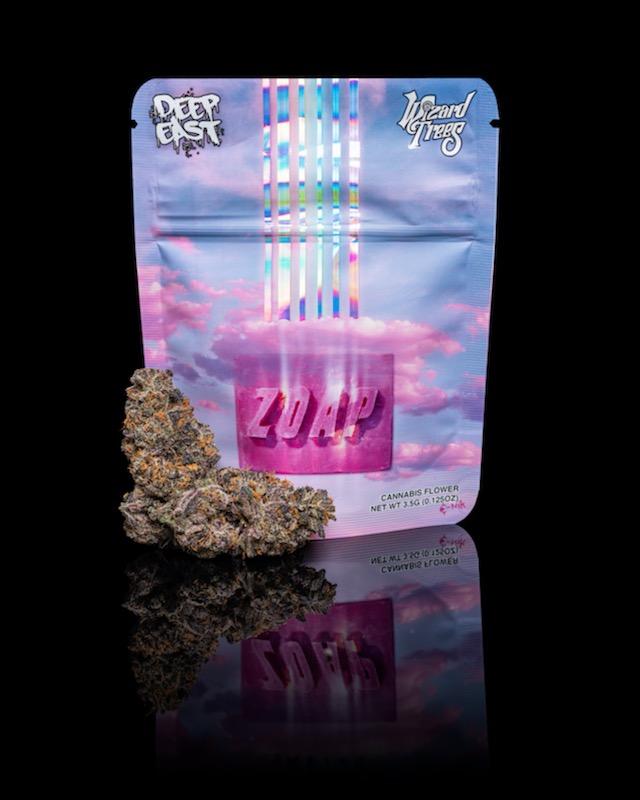
As the subject of the violence of East Oakland entered the conversation, we asked DEO Farms about being one of the companies that are most associated with being exposed to it.
“I have PTSD for sure. I grew up around violence,” he replied. “I don’t have a lot of friends my age left. I really changed my life around and I try to be a positive entity in my city.”
With all the cities and towns in California that would love another successful cannabis entity to tax, how tempting is it for DEO to just pick up shop and move somewhere with less hassle?
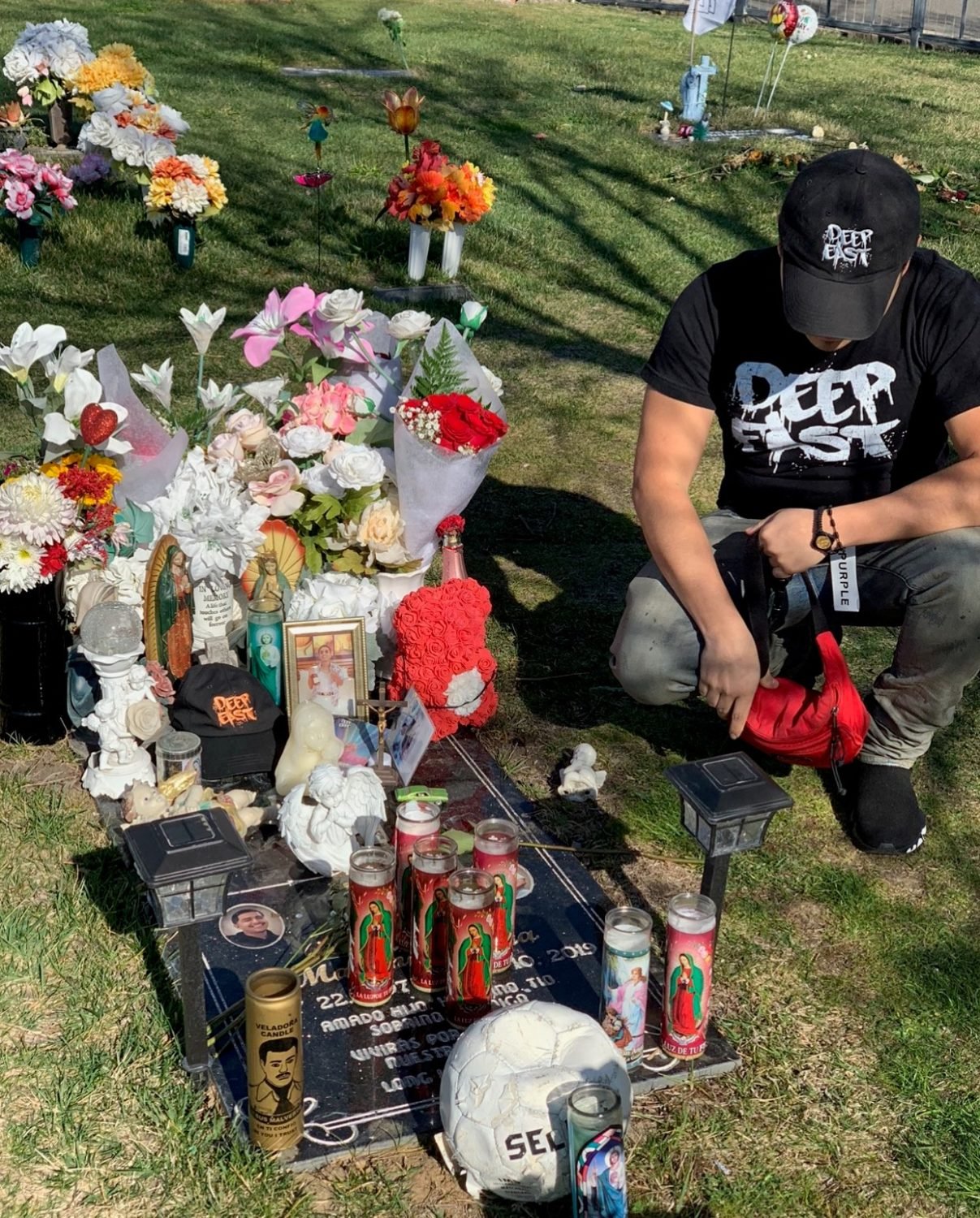
DEO at the grave of fallen team member Nugs.
“Well, it’s tempting, but it’s weird, too. It’s my comfort zone,” he replied. “But I do really plan on moving. I moved out of the flats and I’m kind of more up towards the hill now. It’s just weird. It’s just like your comfort zone. It’s just what you’re used to.”
When we closed up our chat with DEO, we asked if there was anything that he missed that felt important.
“If you’re from The Deep, and you asked me how to grow weed, I will teach you how to grow for free,” he replied. “Like, if you’re from my neighborhood bro, I try to get everyone growing. If you’re from The Deep, reach out to me bro. I will teach you how to grow. I’ll take time out of my day to teach you how to go eat.”
The post Streets to Heat: The Deep East Oakland Farms Story appeared first on LA Weekly.

0 Commentaires